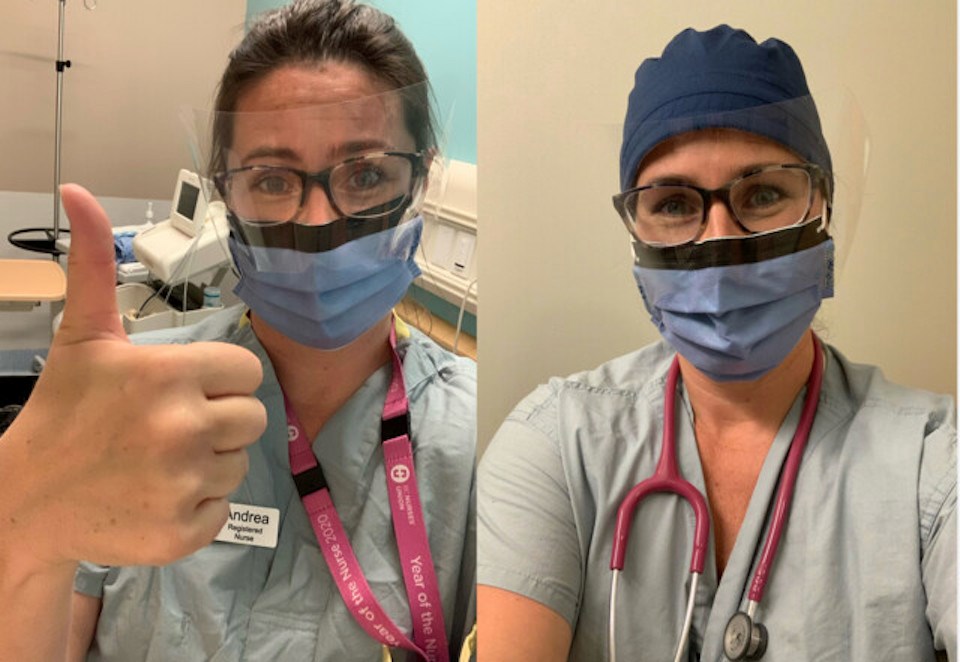As British Columbia's beleaguered healthcare system continues to face critical staffing shortages, a former Kelowna General Hospital nurse forced off the job by the COVID-19 vaccine mandate wants back into the workforce.
Andrea Henders says she was a nurse for almost 12 years and was working at KGH when the provincial government announced it would be terminating all unvaccinated healthcare staff in October 2021.
"We're trained, we're hardworking, we're experienced, we're ready, we're healthy, we'd love to go back to work," Henders told Castanet Tuesday.
"We're being ignored and shamed and blamed and pushed aside when we're professional and ready to help."
B.C. remains one of only two provinces in Canada that have continued to keep vaccine mandates in place for healthcare staff, the other being Nova Scotia. Ontario allows individual hospitals to determine their own approach to vaccine mandates, and several have kept them in place.
Premier David Eby recently announced a new program to pay for application and assessment fees for internationally trained nurses, along with thousands of dollars in support and bursaries for those who return to practice. The move also comes with faster processing times to speed up wait times and offer hope for a strained and understaffed B.C. healthcare system.
Henders, meanwhile, is frustrated.
"What about all the nurses that are sitting around ready to work? Why are you spending our tax dollars to bring in foreign-trained nurses, when there are perfectly experienced, skilled and ready to work nurses right here in B.C."
In response to request for comment, the B.C. Ministry of Health said "in order to protect the province’s most vulnerable and the overall health-care system, COVID-19 vaccination requirements for health-care system workers continue to be in place."
A large study published last year in the New England Journal of Medicine found people who received two doses of the AstraZeneca vaccine had no protection against contracting the Omicron variant after 20 weeks. People who received two doses of Pfizer had just 9 per cent protection after 25 weeks. Moderna drops to 15 per cent after 25 weeks.
Booster doses increase protection significantly, but boosters are not required to be considered vaccinated in B.C.
Henders says getting information about the situation since losing her job has been a challenge.
"It's just like our voices are not being heard at all. We're doing our darndest to contact MPs and MLAs, Adrian Dix and Dr. Bonnie Henry, but we're being completely ignored."
The Ministry of Health's statement says they are expecting another increase in the spread of COVID-19 this winter "the potential for another variant of concern to emerge remains a real concern."
“Vaccine mandates protect vulnerable populations, including older and immunocompromised patients in hospitals, residents in long-term care facilities, as well as health-care workers and the overall health-care system. It is critically important to maintain this layer of protection for all of them."
About 2,500 British Columbian healthcare workers, 900 in the Interior Health region, were terminated last year for being unvaccinated. The government has repeatedly emphasized that bringing back unvaccinated staff will not solve the staffing crunch.
"There's so many of us and someone has to be their voice," Henders said. "I paid good money and put in good time to become an RN and I cannot even work in my province when [B.C.] is in a dire staffing shortage and healthcare crisis right now. I would love to be helping, but nobody is listening."
The BC Ministry of Health says they have no intention of changing its vaccine mandate and are in fact encouraging all health professionals to get vaccinated and boosted.
“In B.C. and globally, measures taken to combat the ongoing public-health emergency remain important. The trajectory of the pandemic over the next few months is uncertain as there is still significant spread of the COVID-19 virus in the province and around the world."



